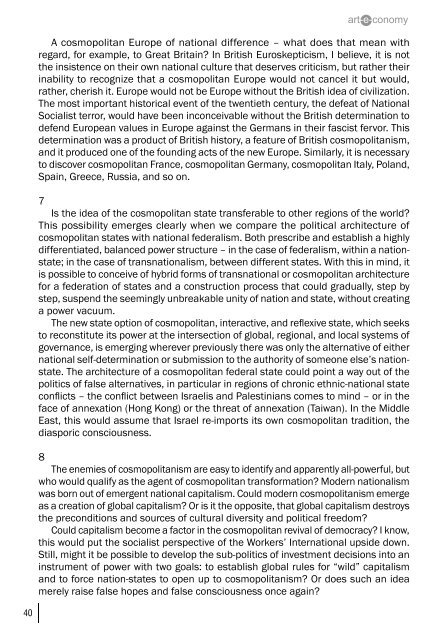art-e-conomy _ reader - marko stamenkovic
art-e-conomy _ reader - marko stamenkovic
art-e-conomy _ reader - marko stamenkovic
You also want an ePaper? Increase the reach of your titles
YUMPU automatically turns print PDFs into web optimized ePapers that Google loves.
40<br />
A cosmopolitan Europe of national difference – what does that mean with<br />
regard, for example, to Great Britain? In British Euroskepticism, I believe, it is not<br />
the insistence on their own national culture that deserves criticism, but rather their<br />
inability to recognize that a cosmopolitan Europe would not cancel it but would,<br />
rather, cherish it. Europe would not be Europe without the British idea of civilization.<br />
The most important historical event of the twentieth century, the defeat of National<br />
Socialist terror, would have been inconceivable without the British determination to<br />
defend European values in Europe against the Germans in their fascist fervor. This<br />
determination was a product of British history, a feature of British cosmopolitanism,<br />
and it produced one of the founding acts of the new Europe. Similarly, it is necessary<br />
to discover cosmopolitan France, cosmopolitan Germany, cosmopolitan Italy, Poland,<br />
Spain, Greece, Russia, and so on.<br />
7<br />
Is the idea of the cosmopolitan state transferable to other regions of the world?<br />
This possibility emerges clearly when we compare the political architecture of<br />
cosmopolitan states with national federalism. Both prescribe and establish a highly<br />
differentiated, balanced power structure – in the case of federalism, within a nationstate;<br />
in the case of transnationalism, between different states. With this in mind, it<br />
is possible to conceive of hybrid forms of transnational or cosmopolitan architecture<br />
for a federation of states and a construction process that could gradually, step by<br />
step, suspend the seemingly unbreakable unity of nation and state, without creating<br />
a power vacuum.<br />
The new state option of cosmopolitan, interactive, and reflexive state, which seeks<br />
to reconstitute its power at the intersection of global, regional, and local systems of<br />
governance, is emerging wherever previously there was only the alternative of either<br />
national self-determination or submission to the authority of someone else’s nationstate.<br />
The architecture of a cosmopolitan federal state could point a way out of the<br />
politics of false alternatives, in p<strong>art</strong>icular in regions of chronic ethnic-national state<br />
conflicts – the conflict between Israelis and Palestinians comes to mind – or in the<br />
face of annexation (Hong Kong) or the threat of annexation (Taiwan). In the Middle<br />
East, this would assume that Israel re-imports its own cosmopolitan tradition, the<br />
diasporic consciousness.<br />
8<br />
The enemies of cosmopolitanism are easy to identify and apparently all-powerful, but<br />
who would qualify as the agent of cosmopolitan transformation? Modern nationalism<br />
was born out of emergent national capitalism. Could modern cosmopolitanism emerge<br />
as a creation of global capitalism? Or is it the opposite, that global capitalism destroys<br />
the preconditions and sources of cultural diversity and political freedom?<br />
Could capitalism become a factor in the cosmopolitan revival of democracy? I know,<br />
this would put the socialist perspective of the Workers’ International upside down.<br />
Still, might it be possible to develop the sub-politics of investment decisions into an<br />
instrument of power with two goals: to establish global rules for “wild” capitalism<br />
and to force nation-states to open up to cosmopolitanism? Or does such an idea<br />
merely raise false hopes and false consciousness once again?


